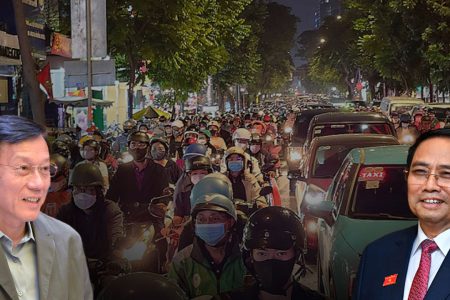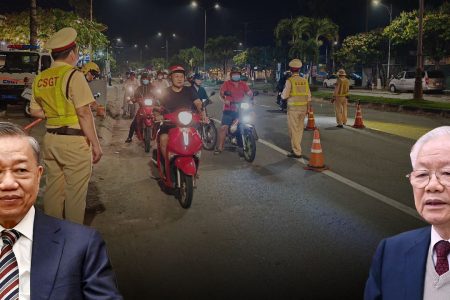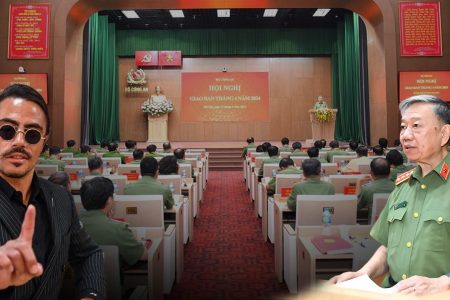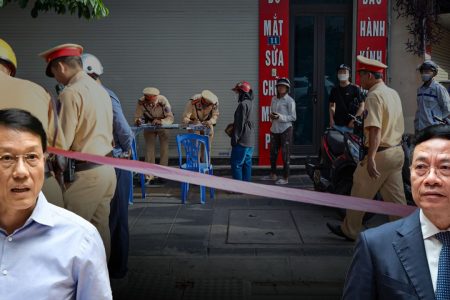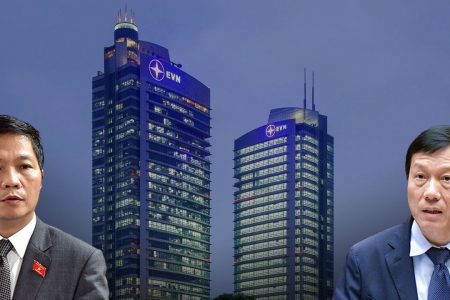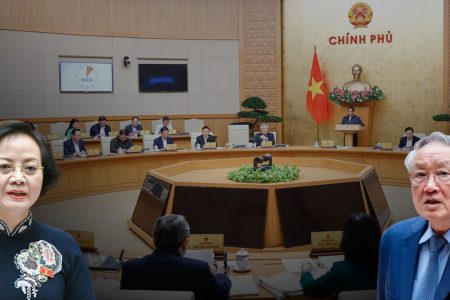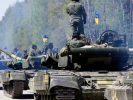
The security situation in the East Sea (South China Sea) and the region are currently “warming up” and there is a tendency to “remarkable deterioration” with the events of “confrontation” or “escalating tension” between the two great powers present in the region- China and the US, according to some views.
It is reported that even this weekend, China is conducting a military exercise in the Hoang Sa (Paracels) in the South China Sea that China has seized from the former Republic of Vietnam government since 1974, with military forces conducting a drill on July 1-5.
According to international media, the US Department of Defense on July 2 issued an official statement expressing concern about Beijing’s exercise decision.
A day earlier, on July 1, the US sent a warship believed to be the USS Gabrielle Giffords to appear in the area of a Chinese survey ship operating under the escort of a missile ship.
On this occasion, on July 2-3, two regional security observers and the South China Sea shared with BBC News Vietnamese their assessment of the situation.
They first answered the question of whether there has been a real escalation between China and the US through recent moves so far, especially through military exercises or drills in the South China Sea.
“What an escalation”
Researcher Hoang Viet (Ho Chi Minh City University of Law): In my opinion, this should actually be China’s escalation worldwide, and with the reaction of many countries, including the US. In particular, the competition between the US and China has caused China to reveal internal instability. So to dominate the world as well as to show the strength and intolerance of China toward the US, China makes the South China Sea more stressful.
Dr. Hà Hoàng Hợp (Senior researcher, Iseas Institute, Singapore): The security situation in the South China Sea this week has significantly deteriorated, due to the presence of Chinese naval vessels, maritime vessels, civilian ships, geological research vessels in the sea in a large area near the Truong Sa (Spratlys) and the Hoang Sa (Paracels).
At the moment China is conducting exercises in the Paracels (until July 5), at least two research ships are traveling in Vietnam’s Exclusive Economic Zone (EEZ), although no exploration has been conducted yet.
The frequency of flying over the South China Sea of Chinese military aircraft is denser, not excluding the number of Chinese submarines moving in the South China Sea and surrounding waters, in the airspace over the Taiwan Strait, at times Chinese military aircraft violated Taiwan’s air defense identification zone.
The US is also conducting exercises in the western Philippines. Three US aircraft carriers are near the South China Sea, with a variety of warships, underground hunting aircraft, early warning and command aircraft with special frequencies and routes, near Chinese military and naval bases in Hainan.
China has stepped up its maritime activities to reinforce its territorial claims in the South China Sea while the US continues its activities to ensure freedom of navigation, with appropriate patrols with higher number of flights and type, apply appropriate military movement plans, which aim to warn China.

Too confident or planned?
BBC: Is China too confident or not when it has just been “assertive,” some say “aggressive” in the regional waters, including the South China Sea, the Taiwan Strait area, the South China Sea, at the same time has the border tension with India?
Researcher Hoang Viet: Currently, the “hawk” group in the People’s Liberation Army of China (PLA) has promoted China’s nationalism. This has made China behave in the way we have seen it.
However, many researchers argue that China is “big” but not “strong” enough to replace the position of the US and the West. Nonetheless, China is still ready to threaten both the world and Asia. It is also partly due to leaders’ “fear” of confronting China. China knows that and has tried to make the most of it. So it’s not exactly that China is confident, but they are taking advantage of the Chinese “fears,” and they know the steps needed to avoid pushing tensions too far.
Dr. Ha Hoang Hop: At this time, China is deploying many activities at sea, from the East China Sea, the Taiwan Strait, the East Taiwan Sea, the South China Sea, two straits in the South China Sea connecting to the Indian Ocean, the Strait of Malacca, and the entire sea area close to Indonesia.
On land, apart from tensions with India, China has territorial disputes with 14 other countries (if including the countries to which China has territorial disputes at sea, 18 countries). This is a planned strategic activity, so China should not be said to be “aggressive” or “assertive.”
It is true that China is making stronger, wider, more integrated synergies and coordination from the Chinese central levels. Despite the actual correlation of defense capacity, China has forced itself to act strongly in coordinating political, policy, foreign and military activities.
Once China is adopting aggressive diplomacy (warfare), China has done the same with its military activities.
BBC: How do you assess the recent ASEAN joint statement on its position with the South China Sea? Is this a new step in the hinge, or just the situation, because Vietnam is the current president of this group?
Researcher Hoang Viet: In the recent statement of Asean, there are new advances. Call it a step forward because it is not only an attempt by Vietnam – Asean president this year.
We also see that the attitude of other nations has changed over a recent series of notes / correspondence. First Malaysia, then Philippines, Vietnam, Indonesia. In particular, the Philippines has changed a lot with sending a diplomatic note against China, withdrawing the cancellation of the Visit Forces Agreement (VFA) with the US.
Next is Indonesia. Although Indonesia has always kept quiet before, the Chinese threat to the Natuna region has prompted Indonesia to speak clearly. That change is the main impetus for the recent ASEAN Declaration.
Dr. Ha Hoang Hop: Statement of ASEAN’s President for the 36th Summit on the issue of the South China Sea is a clear, strong statement, expressing ASEAN’s consensus in wanting and acting for resolving South China Sea issues based on international law, including the 1982 United Nations Convention on the Law of the Sea.
The statement also emphasized ASEAN’s promotion of the Code of Conduct in the South China Sea (COC) with China in a positive way, so as to achieve a true COC, in line with international law. The Covid-19 pandemic make ASEAN countries more united; The statement of Asean president this time is a real step, catching up and seizing the good opportunity to be able to hope to negotiate substantially COC.
If COC negotiation here does not make positive progress, it will also be a fact that reflects the nature and conditions for the countries in dispute in the South China Sea, including Vietnam, to consider other measures, including legal remedies.
Things to look out for and care about?
BBC: Regarding the issue of the South China Sea, is there any security issue that Vietnam as well as now should pay attention to?
Researcher Hoang Viet: In my opinion, the South China Sea issue as well as regional security are still facing many challenges and risks. Therefore, Vietnam needs to have a plan to prepare for the cases, including the worst cases, so as not to be passive.
Dr. Ha Hoang Hop: Vietnam always closely monitors the situation in the South China Sea, it can be said that Vietnam is not surprised, always proactive and comprehensive actions, suitable to contribute to ensuring security in the South China Sea.
The process of defense modernization, especially the modernization of the navy, air force, and air defense, has had positive results.
Increased defense capacity and comprehensive consolidation are the conditions for successful self-defense, ensuring security at sea and protecting Vietnam’s sovereignty. State diplomacy and defense cooperation with other countries are very important.
Medium and long-term forecast?
BBC: The story of the Repsol oil and gas company withdrawing from Vietnam recently has caused many rumors. In your opinion, what does Vietnam need to do to avoid repeating and preventing that?
Researcher Hoang Viet: According to international practice, if one party requests to stop the contract, that party must be obliged to pay damages to the other party. The damage shall include costs incurred by the other party together with losses of material benefits which the parties in contract performance have expected to achieve.
Although the Vietnamese government did not provide any official information, according to international media, the Vietnamese government was under pressure from China to ask Repsol to stop exploiting at Lot 136.3 and 07.3.
If so, of course Vietnam has an obligation to compensate Repsol.
Such a deal is often very costly, up to billions of US dollars. Therefore, the possibility of compensation if any will also be very large.
Not to mention that requesting Repsol to stop such exploitation will create bad sentiments for international oil and gas investors and cause Vietnamese people to doubt the government’s determination. Therefore, it is impossible to let such a situation occur.
Dr. Ha Hoang Hop: The above information has not been confirmed by the Vietnamese government and PetroVietnam. In fact, Vietnam refuses to be under ties or threatened in the territory and where Vietnam has sovereignty and sovereignty right.
With a specific case of one-two joint ventures, it is okay to lose and cannot criminalization of Vietnam and international law!
BBC: Do you have any further forecasts or comments about the situation in the South China Sea here with the vision not only in the short, medium term but also in the longer term?
Researcher Hoang Viet: Regarding the South China Sea issue, it is much more complicated. But it can be commented that China will not change its ambition to monopolize the South China Sea, if it is not forced to do otherwise. And letting China go down the ladder in its ambitions is not an easy thing. That said, we will know that the situation in the South China Sea will continue to tense in the near future.
Dr. Ha Hoang Hop: Regarding the South China Sea, in my opinion China will be more determined to occupy the sea along the 9-dotted line, expanding according to the Sansha diagram. This is the most obvious manifestation of hegemony, and with this hegemony politics, it is difficult for China to avoid trapping Thucydides with the US and its allies.
The risk of armed conflict and war in the South China Sea is growing, sometimes growing fast! The US appreciates the role and power of ASEAN which will have to be an important partner to ensure its own security.
Vietnam has no other way, is to become a middle-class country, so that it can successfully defend itself and contribute to Southeast Asia’s security and peace.
Thoibao.de (Translated)







